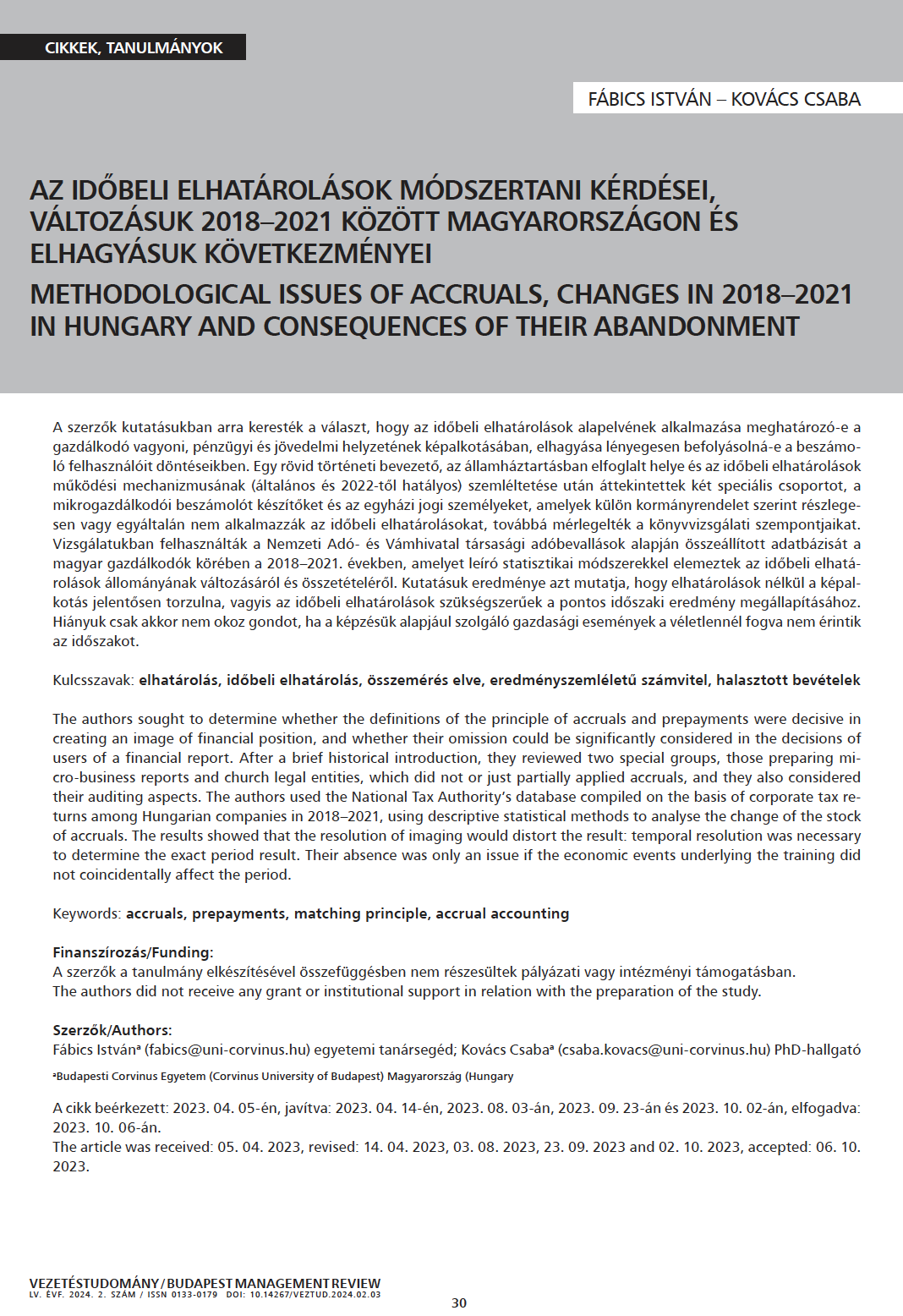Methodological issues of accruals, changes in 2018–2021 in Hungary and consequences of their abandonment
DOI:
https://doi.org/10.14267/VEZTUD.2024.02.03Keywords:
accruals, prepayments, matching principle, accrual accountingAbstract
The authors sought to determine whether the definitions of the principle of accruals and prepayments were decisive in creating an image of financial position, and whether their omission could be significantly considered in the decisions of users of a financial report. After a brief historical introduction, they reviewed two special groups, those preparing micro-business reports and church legal entities, which did not or just partially applied accruals, and they also considered their auditing aspects. The authors used the National Tax Authority’s database compiled on the basis of corporate tax returns among Hungarian companies in 2018–2021, using descriptive statistical methods to analyse the change of the stock of accruals. The results showed that the resolution of imaging would distort the result: temporal resolution was necessary to determine the exact period result. Their absence was only an issue if the economic events underlying the training did not coincidentally affect the period.
Downloads
References
Borbély, K., & Lukács, L.I. (2018). Schmalenbach munkássága és hatása a magyar számvitelre. Controller Info, 6(1), 21-26. https://doi.org/10.24387/CI.2018.1.5
Borbély, T., Szikszainé Király, M., & Kakas, S. (2021). Eredményszemléletű számvitel – egy kihasználatlan lehetőség a költségvetési szervek teljesítményének mérésére. Pénzügyi Szemle, 66(Special edition 2021/2), 51–72. https://doi.org/10.35551/PSZ_2021_k_2_3
Bradshaw, M.T., Richardson, S.A., & Sloan, R.G. (2001). Do analysts and auditors use information in accruals? Journal of Accounting Research, 39(1), 45–74. https://doi.org/10.1111/1475-679X.00003
Carmona, S., & Ezzamel, M. (2007). Accounting and accountability in ancient civilizations: Mesopotamia and ancient Egypt. Accounting, Auditing & Accountability Journal, 20(2), 177–209. https://doi.org/10.1108/09513570710740993
Chatfield, M., & Vangermeersch, R.G.J. (Eds.). (2015). The history of accounting: An international encyclopedia. Routledge.
Denich, E., & Hajdu, D. (2021). A kreatív számvitel alkalmazásának vizsgálata Transparency and Disclosure Index (TDI-) módszer segítségével autóipari cégeknél. Pénzügyi Szemle, 66(3), 390–405. https://doi.org/10.35551/PSZ_2021_3_4
Fábics, I., & Lukács, J. (2021). Az egyházi jogi személy számviteli és könyvvizsgálati sajátosságai. Számvitel Adó Könyvvizsgálat, 63(10), 33–35. http://szak-ma.hu/szamvitel/az-egyhazi-jogi-szemely-szamviteli-es-konyvvizsgalati-sajatossagai-102935
Finley Graves, O. (1992). Dynamic theory and replacement cost accounting: TheSchmalenbach‐Schmidt polemic of the 1920s. Accounting, Auditing & Accountability Journal, 5(1). https://doi.org/10.1108/09513579210008262
Hegedűs, M., Cseh, B., & Fábics, I. (2020). Accounting aspects of digitalization and industry 4.0 in Hungary. Regional and Business Studies, 12(2), 1–15. https://doi.org/10.33568/rbs.2508
Li, H., & Li, S. (2023). The changing role of accrual accounting: international evidence. Journal of International Accounting Research, 22(2), 149–170. https://doi.org/10.2308/JIAR-2022-019
Mattessich, R., & Küpper, H. (2003). Accounting research in the German language area – first half of the 20th century. Review of Accounting and Finance, 2(3), 106–137. https://doi.org/10.1108/eb027015
Oulasvirta, L. (2014). The reluctance of a developed country to choose International Public Sector Accounting Standards of the IFAC. A critical case study. Critical Perspectives on Accounting, 25(3), 272–285. https://doi.org/10.1016/j.cpa.2012.12.001
Previts, G.J., Walton, P.J., & Wolnizer, P.W. (Eds.). (2012). A global history of accounting, financial reporting and public policy: Eurasia, the Middle East and Africa (1st ed). Emerald.
Quinn, M., & Strauss, E. (Eds.). (2017). The Routledge Companion to Accounting Information Systems (1st ed.). Routledge. https://doi.org/10.4324/9781315647210
Strauß, E., & Zecher, C. (2013). Management control systems: A review. Journal of Management Control, 23(4), 233–268. https://doi.org/10.1007/s00187-012-0158-7
Szüle, B. (2019). Klaszterszám-meghatározási módszerek összehasonlítása. Statisztikai Szemle, 97(5), 421–438. https://doi.org/10.20311/stat2019.5.hu0421
Tan, H., Wang, S., & Welker, M. (2011). Analyst following and forecast accuracy after mandated IFRS adoptions: analyst following and forecast accuracy. Journal of Accounting Research, 49(5), 1307–1357. https://doi.org/10.1111/j.1475-679X.2011.00422.x
Tarpataki, E., Filyó, J., & László, N. (2022). Magyar vállalkozások áttérése az IFRS-alapú beszámolóra a hitelbírálatok során használt mutatószámok tükrében. Hitelintézeti Szemle, 21(1), 95–112. https://doi.org/10.25201/HSZ.21.1.95
Tawiah, V. (2023). The impact of IPSAS adoption on corruption in developing countries. Financial Accountability & Management, 39(1), 103–124. https://doi.org/10.1111/faam.12288
IFRS Koncepcionális Keretelvek (2022). IFRS Accounting Standards Navigator. https://www.ifrs.org/issued-standards/list-of-standards/conceptual-framework.html/content/dam/ifrs/publications/html-standards/english/2022/issued/cf/
IFRS (2022). IAS 1 – A pénzügyi kimutatások prezentálása. IFRS Accounting Standards Navigator. https://www.ifrs.org/issued-standards/list-of-standards/ias-1-presentation-of-financial-statements.html/content/dam/ifrs/publications/html-standards/english/2022/issued/ias1/
IAASB (2021a). ISA 200 – A független könyvvizsgáló átfogó céljai és a könyvvizsgálatnak a nemzetközi könyvvizsgálati standardokkal összhangban történő végrehajtása. 2021 Handbook of International Quality Control, Auditing, Review, Other Assurance, and Related Services Pronouncements. https://www.iaasb.org/publications/2021-handbook-international-quality-control-auditing-review-other-assurance-and-related-services
IAASB (2021b). ISA 700 – A pénzügyi kimutatásokra vonatkozó vélemény kialakítása és jelentéskészítés. 2021 Handbook of International Quality Control, Auditing, Review, Other Assurance, and Related Services Pronouncements. https://www.iaasb.org/publications/2021-handbook-international-quality-control-auditing-review-other-assurance-and-related-services
IAASB (2021c). ISA 705 – A független könyvvizsgálói jelentésben szereplő vélemény minősítései. 2021 Handbook of International Quality Control, Auditing, Review, Other Assurance, and Related Services Pronouncements. https://www.iaasb.org/publications/2021-handbook-international-quality-control-auditing-review-other-assurance-and-related-services
IAASB (2021d). ISA 706 – Figyelemfelhívó bekezdések és egyéb kérdések bekezdések a független könyvvizsgálói jelentésben. 2021 Handbook of International Quality Control, Auditing, Review, Other Assurance, and Related Services Pronouncements. https://www.iaasb.org/publications/2021-handbook-international-quality-control-auditing-review-other-assurance-and-related-services
'2000. évi C. törvény a számvitelről. Nemzeti Jogszabálytár. https://njt.hu/jogszabaly/2000-100-00-00
'2021. évi LXIX. törvény egyes adótörvények módosításáról. Nemzeti Jogszabálytár. https://njt.hu/jogszabaly/2021-69-00-00
'398/2012. (XII. 20.) Korm. rendelet a mikrogazdálkodói egyszerűsített éves beszámolóról. Nemzeti Jogszabálytár. https://njt.hu/jogszabaly/2012-398-20-22
'296/2013. (VII. 29.) Korm. rendelet az egyházi jogi személyek beszámolókészítési és könyvvezetési kötelezettségének sajátosságairól. Nemzeti Jogszabálytár. https://njt.hu/jogszabaly/2013-296-20-22
'4/2013. (I. 11.) Korm. rendelet az államháztartás számviteléről. Nemzeti Jogszabálytár. https://njt.hu/jogszabaly/2013-4-20-22

Downloads
Published
How to Cite
Issue
Section
License
Copyright (c) 2024 Vezetéstudomány / Budapest Management Review

This work is licensed under a Creative Commons Attribution 4.0 International License.
Authors assign copyright to Vezetéstudomány / Budapest Management Review. Authors are responsible for permission to reproduce copyright material from other sources.

